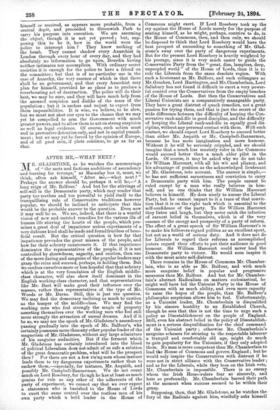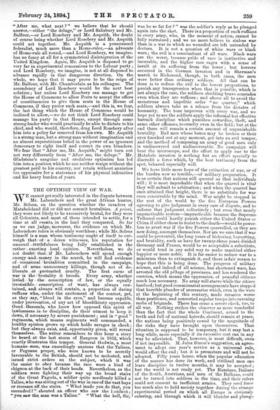AFTER ME,—WHAT NEXT ?
MR. GLADSTONE, as he watches the murmurings of " the sects and factions ambitious of ascendency and burning for revenge," as Macaulay has it, must, we think, often ask himself, "After me,—what next " Perhaps the answer should be, perhaps it will A long reign of Mr. Balfour.' And but for the stirrings of self-will in the Democratic party, which may render that party too restless and too powerful to yield itself to the tranquillising rule of Conservative traditions however popular, we should be inclined to anticipate that this would be the probable answer to the question. Even now it may well be so. We see, indeed, that there is a wistful vision of new and untried remedies for the various ills of human life stirring the hearts of the people, which pro- mises a great deal of impatience unless experiments of a very dubious kind shall be made and found fruitless of bene- ficial result. But the critical question is how far that impatience pervades the great masses of the people, and how fax their sobriety counteracts it. If that impatience dominates the representatives of the people, if it is not controlled by shrewdness, sagacity, and caution, then one of the more daring and sanguine of the popular leaders may grasp the reins and succeed, perhaps, in holding them. But we confess ourselves more or less hopeful that that sobriety which is at the very foundation of the English middle- class character, will also show itself dominant in the English working-class character, and that representatives like Mr. Burt will make good their influence over the masses, rather than representatives of the type of Mr. Woods or Mr. Barns. Still, this is just the question. We may find the democracy inclining as much to caution as the temper of the middle-class. We may find the working men who feel strongly the magic of property asserting themselves over the working men who feel still more strongly the attraction of unreal dreams. And if it be so, we may see the epoch of Mr. Gladstone's ascendency passing gradually into the epoch of Mr. Balfour's, who certainly possesses more than any other popular leader of the msgnetism of Mr. Gladstone, without any large admixture of his sanguine audacities. But if the ferment which Mr. Gladstone has certainly introduced into the blood of political Liberalism does not admit of so safe a solution of the great democratic problem, what will be the prospect then ? For there are not a few rising men whose instinct leads them to try dangerous experiments rather than to eschew them,—especially, for instance, Mr. Asquith, and possibly Mr. Campbell-Bannerman. We do not count much on Lord Rosebery, for though he has at least as much genius for rule as any other of the adherents of the party of experiment, we cannot say that we ever expect a statesman who is banished to the House of Lords to exert the same control over the restless men of his own party which a bold leader in the House of Commons might exert. If Lord Rosebery took up the cry against the House of Lords merely for the purpose of seating himself, as he might, perhaps, contrive to do, in the House of Commons, then, and then only, we should be disposed to think that Lord Rosebery would have the best prospect of succeeding to something of Mr. Glad- stone's sway over the party of dangerous experiments. But for the present Lord Rosebery is heavily weighted by his peerage, since it is very much easier to guide the Conservative Party from the " great, dim, lampless, deep, unpeopled world " of the House of Lords, than it is to rule the Liberals from the same desolate region. With such a lieutenant as Mr. Balfour, and such colleagues as Mr. Goschen, Lord Hartington, and Mr. Chamberlain, Lord Salisbury has not found it difficult to exert a very power- ful control over the Conservatives from the empty benches of the House of Lords. But then the Conservatives and Liberal Unionists are a comparatively manageable party. They have a great distrust of quack remedies, not a great passion for trying them, and that is just the secret of the wide difference between the difficulty of keeping the Con- servative rank-and-file in good discipline, and the difficulty of keeping the Liberal rank-and-file in equally good dis- cipline, without any personal contact with them. With such contact, we should expect Lord Rosebery to succeed better than either Mr. Asquith or Mr. Campbell-Bannerman, because he has more imagination and more humour. Without it he will be seriously crippled, and we should imagine that a much less masterly ruler in the Commons would succeed better than a much abler pilot in the Lords. Of course, it may be asked why we do not take Sir William Harcourt, with all his wit and pliancy, and his advantage of position as the acknowledged lieutenant of Mr. Gladstone, into account. The answer is simple,— he has not sufficient earnestness and conviction to carry a Democratic party with him. The people cannot be ruled except by a man who really believes in him- self, and no one thinks that Sir William Harcourt believes in himself. Ite does nicely to amuse the Liberal Party, but he cannot impart to it a trace of that convic- tion that it is on the right tack which is essential to the self-confidence of the party. To Sir William Harcourt they listen and laugh, but they never catch the infection of earnest belief in themselves, which is of the very essence of the energy and prosperity of a party of reform. The effect of a great speech of Sir William.Harcourt's is to make his followers regard politics as an excellent sport, but not as a world of serious duty. And it does not do for Liberals to regard their reforms as accomplished jesters regard their efforts to put their audience in good humour. Sir William Harcourt could never lead the Democratic party to victory. He would soon inspire it with the most acute self-distrust.
There remains in the House of Commons Mr. Chamber- lain, who is as able as Mr. Balfour, and with much more sanguine belief in popular and progressive measures than Mr. Balfour. And but for Mr. Chamber- lain's abstract Radicalism on matters ecclesiastical, he might well have led the Unionist Party in the House of Commons with as much ability, and even more capacity to raise the hopes of the people, than Mr. Balfour's philosophic scepticism allows him to feel. Unfortunately, as a Unionist leader, Mr. Chamberlain is disqualified by his sincere hostility to an Established Church, though he sees that this is not the time to urge such a policy as Disestablishment on the people of England. Still, even his abstract belief in the policy of Disestablish- ment is a serious disqualification for the chief command of the Unionist party ; otherwise Mr. Chamberlain's sanguine schemes for securing to the respectable labourer a tranquil and comfortable old age, might do much to gain popularity for the Unionists, if they only adopted them. No man is more competent than Mr. Chamberlain to lead tke House of Commons and govern England ; but he would only inspire the Conservatives with distrust if he were not in strict alliance with the Conservative leader ; and as for the Liberals, while they lean on the Irish vote, Mr. Chamberlain is impossible. There is no enemy whom the Irish Home-rulers fear so sincerely, and hate so profoundly. Mr. Chamberlain barred their path at the moment when success seemed to be within their grasp. Supposing, then, that Mr. Gladstone, as he watches the fury of the Radicals against him, wistfully asks himself " After me, what next ? " we believe that he should answer,—either " the deluge," or Lord Salisbury and Mr. Balfour,—or Lord Rosebery and Mr. Asquith, the doubt of course being whether Lord Rosebery and Mr. Asquith could act together. Mr. Asquith is a pronounced federalist, much more than a Home-ruler,—an advocate of Home-rule all round,—and Lord Rosebery, we imagine, has no fancy at all for a symmetrical disintegration of the United Kingdom. Again, Mr. Asquith is disposed to go very far in experimental concessions to the Labour party ; and Lord Rosebery, we imagine, is not at all disposed to advance rapidly in that dangerous direction. On the whole, we hope that it may prove to be the reign of Mr. Balfour, with Mr. Chamberlain as his colleague. The ascendency of Lord Rosebery would be the next best solution ; but unless Lord Rosebery can manage to get the House of Commons to allow Peers to accept the offers of constituencies to give them seats in the House of Commons, if they prefer such seats,—and this is, we fear, the last thing which the House of Commons would be inclined to allow,—we do not think Lord Rosebery could manage his party in that House, except through some strong leader who would practically be able to dictate to his chief, and who would, therefore, drag Lord Rosebery after him into a policy far removed from his own. Mr. Asquith is a strong man, but a strong man without imagination and an almost superstitious belief in the power of an ignorant democracy to right itself and correct its own blunders. We fear that " After me, Mr. Asquith," might turn out not very differently from " After me, the deluge." Mr. Gladstone's sanguine and credulous optimism has led him into a position which he can neither resign without the greatest peril to his country, nor retain without anxieties too oppressive for a statesman of his physical infirmities and his heavy burden of years.



































 Previous page
Previous page